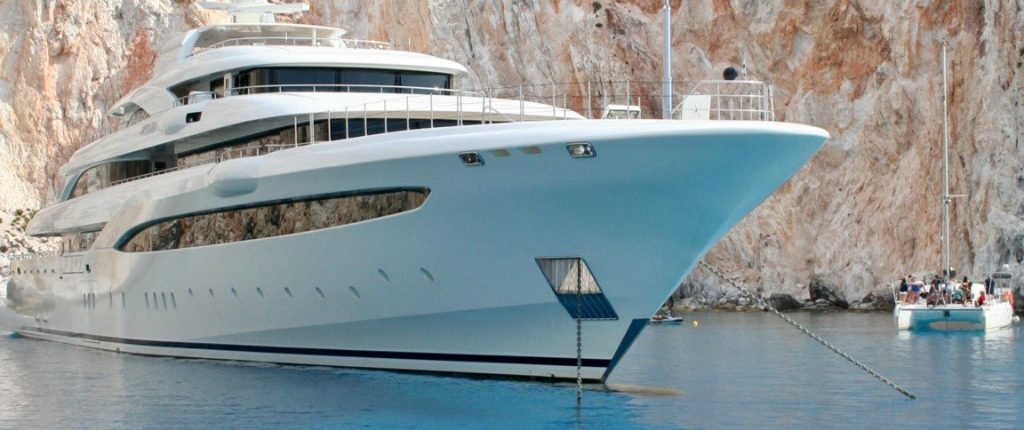Putin and the Oligarchs: This is how they hide their wealth
For decades, Russian oligarchs have moved illegally acquired funds abroad and put them in shell companies, which makes it extremely difficult to trace their transactions.
But now countries around the world are taking new ways to do so, according to the BBC.
big quantities
There are large amounts of “Russian hidden money” in the world. The Atlantic Council estimates that Russians have about $1 trillion (£750 billion) in “dark money” stashed abroad.
Putin’s controls
A quarter of the huge amount is said to be controlled by Russian dictator Vladimir Putin and his close associates – rich Russians known as “the oligarchy,” according to the Atlantic Council report.
“These funds can be used and controlled by the Kremlin for its own purposes such as espionage, terrorism, industrial espionage, bribery, political manipulation, disinformation and many other bad purposes,” the think tank wrote in a report.
This is how things go
Another US think tank, the National Endowment for Democracy, notes that Putin encouraged those close to him to steal the state budget, extort money from private companies, and even arrange a direct takeover of profitable companies.
In this way, Putin and the oligarchs built their vast fortunes, according to the think tank report.
steal money
Russian opposition leaders Boris Nemtsov and Vladimir Milov claimed that between 2004 and 2007, $60 billion of money from the oil giant Gazprom was transferred to Putin’s friends.
Data from the leaked “Pandora Papers” documents, published by the International Consortium of Investigative Journalists in October 2021, show that many people close to the Russian dictator have become very wealthy and can help the dictator move around his fortune, the BBC has learned.
Money is stored here
Historically, a large proportion of the fortunes of Putin and the ruling oligarchy were invested in Cyprus, which attracted decent taxes. For some, Cyprus has become known as “Moscow across the Mediterranean”.
In 2013, Russian money totaling $36 billion went to the island. Much of the amount came from shell companies used to hide the true owners of the money, according to the Atlantic Council report.
It had far-reaching consequences. In 2013, the International Monetary Fund persuaded Cyprus to close tens of thousands of bank accounts owned by shell companies.
money laundering
The breadth of Russian money laundering was revealed in a report from 2014. It showed that between 2011 and 2014, Russian banks laundered $20.8 billion worth of money to 5,140 companies in 96 different countries.
This is how money is hidden
The most common method used by oligarchs to hide their money abroad is the use of shell companies.
They employ the world’s best lawyers, accountants, bankers, and lobbyists to develop ways to hide and launder their money, the Atlantic Council wrote.
The think tank explains that the big oligarchy has several “layers” of anonymous shell companies with which their money moves in a jiffy.
In 2016, the International Consortium of Investigative Journalists published data in the “Panama Papers” that showed that a single company had started 2,071 shell companies of rich Russians.
This is how you can access the money
After the Russian invasion of Ukraine, it became very important for the outside world to keep track of Russian money. A number of states have taken several measures, according to BBC reports.
United States of America
The United States brought together a new unit, the KleptoCapture Task Force, which was established in March. The goal is to impose sanctions on the Russian oligarchy in response to the Russian invasion of Ukraine. The unit is run by the Ministry of Justice and the goal is to confiscate illicit assets from the oligarchy.
United kingdom
The British government has taken steps to expand its use of Unexplained Wealth Orders (UWOs), which force people to report and prove where they got their money from when buying assets in the country.
new law
Account Freezing Orders (AFOs) have given British courts permission to freeze funds in a bank if they suspect the funds are linked to criminal activity. In addition, the government has passed a new law on economic crimes, which contains a registry of real estate ownership, which facilitates the identification of foreign entities who own property in the country.
The United Kingdom, along with Cyprus, Malta and Bulgaria, also abolished the “golden passport”, which granted the right of residence to wealthy foreigners who had invested large sums of money in the country.
Photo: C Poggio
Text: Editors

“Extreme tv maven. Beer fanatic. Friendly bacon fan. Communicator. Wannabe travel expert.”







More Stories
Brexit brings economic uncertainty – Finland worst hit in the long run – Hufvudstadsbladet
Britain wants closer ties with the European Union.
Britain may already be out of recession